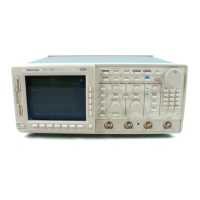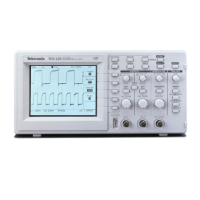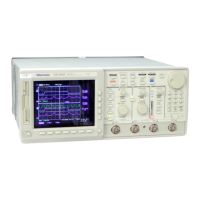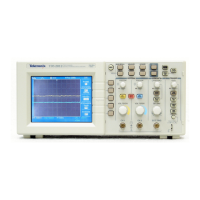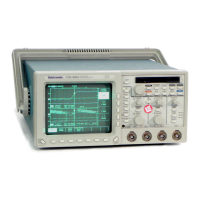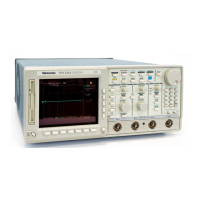Adjustment Procedures
5–2
TDS 500B, 600B and TDS 700A Service Manual
Except when adjusting the display assembly, the cabinet is not removed. Instead,
you enable the internal adjustment constants of the oscilloscope to be written.
Two small holes in the chassis allow service personnel to insert a tool and push a
switch to enable or disable the writing of new adjustment constants to nonvola-
tile RAM.
The procedure that follows will tell you how and when to enable and disable the
writing of adjustment constants. Be sure to disable the switch when you have
finished adjusting the oscilloscope.
The following computer and peripherals are required to adjust this oscilloscope.
An IBMR PCt compatible computer equipped as follows:
H Eight MHz clock speed or faster.
H DOS 3.2 or higher.
H 640K Resident RAM with 580 K Available RAM.
H A hard drive.
H A high-density floppy drive: 3.5 inch (1.44 M) or 5.25 inch (1.2 M).
H A GPIB board — National InstrumentsR
GPIB-PCII, GPIB-PCIIA or
GPIB-PCII/IIA. (A PC-GPIB Package that includes the PCII/IIA is
available — Tektronix part number S3FG210)
H Suitable keyboard and monitor.
Installation of a math coprocessor in your system is strongly recommended to
decrease the time required to adjust the oscilloscope.
The equipment list, starting on page 5–5, lists all test equipment required to
adjust this oscilloscope.
Usage
The following topics cover what is required of you when adjusting the oscillo-
scope and what is done by the software. Also, the performance of individual
adjustments is discussed.
When using the adjustment software, you will not be required to manually adjust
any circuits. As you run the calibration tests, the software adjusts the circuits
using external standards you provide in response to prompts on the computer
Access
System
Optional Peripherals
Test Equipment
Performing the
Adjustments

